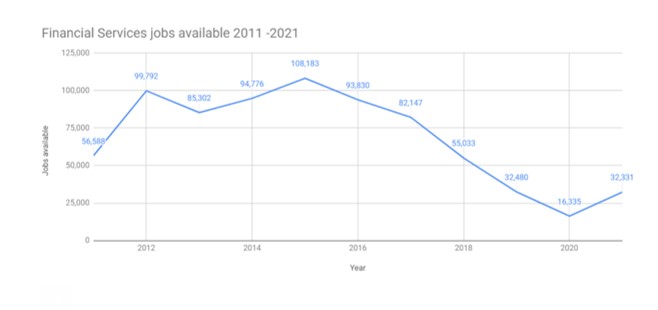Statistics
London's Financial Centre Recovers, Shrugs Aside Brexit – Data

The figures point to a talent shortfall rather than a surplus of financial industry people struggling to find a job in London's City and wider financial community. Fintech is a particular driver.
London’s financial industry is recovering from the pandemic and
on target to chalk up real growth this year, with 40 per cent
more jobs advertised in the fourth quarter of 2021 versus
the same period in 2019, recruiter firm Morgan McKinley said
yesterday.
More than a quarter of people surveyed (34 per cent) were looking
for new job opportunities, the organisation said. When
annualised, figures show a small change in total jobs available
between 2021 and 2019.
“The future is bright for City recruitment as the country starts
to see the light at the end of the pandemic tunnel. With many
companies getting their heads around working from home in 2021
and children back in school, we saw the sector grow beyond
pre-pandemic levels by the end of last year,” Hakan Enver,
managing director, Morgan McKinley UK, said.
The report adds to a general sense that the jobs market for
financial services – at least in certain fields – is tight,
creating a challenge for wealth managers and others to source
talent without busting their budgets. (See
a story here.)
In total in 2021, there were 32,331 financial services jobs
created in London, a 118 per cent surge from 2020 and a 30 per
cent year-on-year increase in jobs seekers. The largest jobs rise
came in Q2 2021, when there was a 211 per cent jump in new jobs
available compared with the same quarter in 2020. The monitor
also showed that recruitment activity dropped for Q4 compared
with Q3 for jobs available (29 per cent) and job seekers (12 per
cent).

Source: Morgan McKinley
“Thanks to the UK’s vaccine programme and people returning to the
office, London’s financial sector is strong and thriving,
bouncing back from the poor showing of jobs across 2020. In broad
terms, the job numbers continued to reflect an encouraging
recovery from the impact of Brexit, furlough scheme, pandemic,
and lockdowns,” Enver continued. “However, there was a drop in
jobs available in Q4 due to two main factors. Firstly, the
emergence of the Omicron variant and activation of Plan B created
some uncertainty across businesses. Second, the reduced headcount
due to more people taking their annual leave at the end of the
year, and businesses closing early for Christmas.”
Rising demand for staff will boost salary levels, he
said.
“With the increase in demand from companies looking to hire
exceptional talent, this would naturally cause the price of
hiring to increase. With slightly lower volumes of job seekers
available compared to job opportunities, base salary increases
held strong, as organisations tried their best to fend off the
competition. The average change in salaries was comparable to
those of 2018 and it is expected that they will remain as such
through 2022 as competition for talent continues to dominate,”
Enver said.
The report also said that the figures showed that London has
largely avoided the negative impact of the UK’s departure from
the European Union.
“Back in 2016, there were numerous reports circulating that up to
100,000 jobs would be lost from the UK to the EU following
Brexit. Five years later, this hasn't happened and is likely
never to happen in those volumes. Many institutions have either
established a new entity abroad or enhanced their existing
operations within a European jurisdiction. However, London
continues to be a central location to conduct business,” Enver
said.
“According to the latest EY Financial Services Brexit Tracker
survey, the number of relocations from London to the EU dropped
year-on-year. Many investment banks have reconsidered their plans
and as such reduced the number of roles they will eventually
move. COVID has contributed to this with the concerns and
restrictions around travel, particularly into Europe which has
deterred many from relocating. The preference is to remain in
London and consider an alternative role here, where the markets
continue to be buoyant,” he added.
The report said that fintech has become a growth driver for jobs
in London.
According to Innovate Finance, investment into UK fintechs jumped
more than 217 per cent to $11.6 billion in 2021, second only to
US firms. The technology sector has seen £26 billion in venture
capital, record London listings, more jobs and a rise in the
number of British unicorns to 116, the report added.
